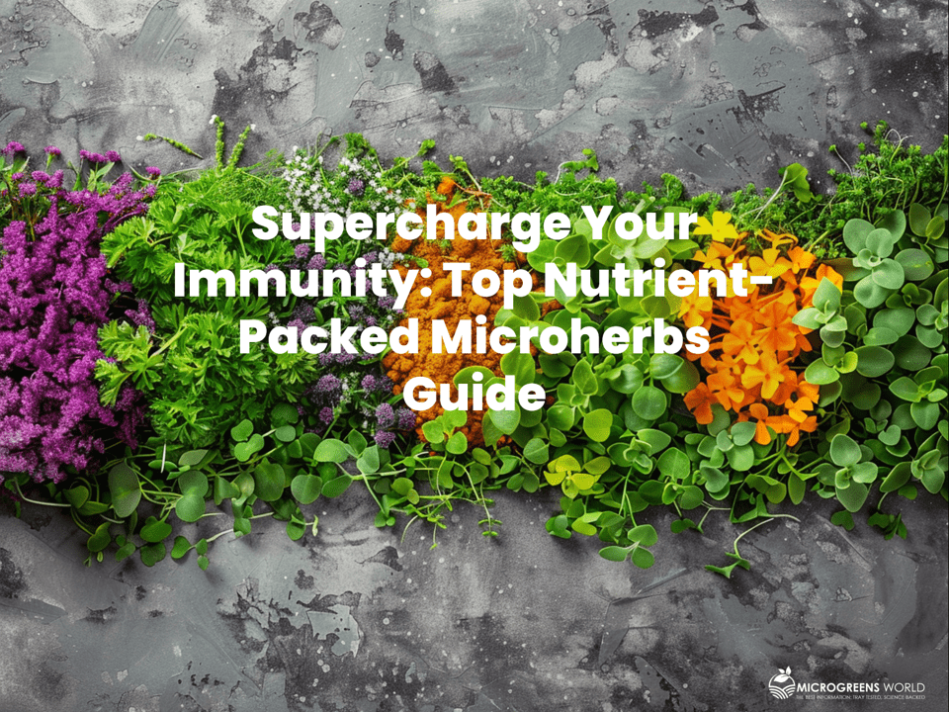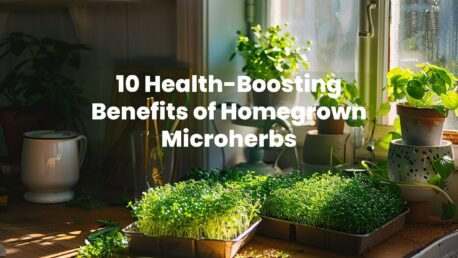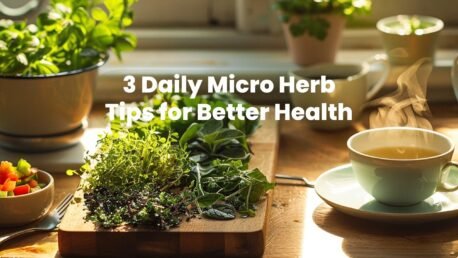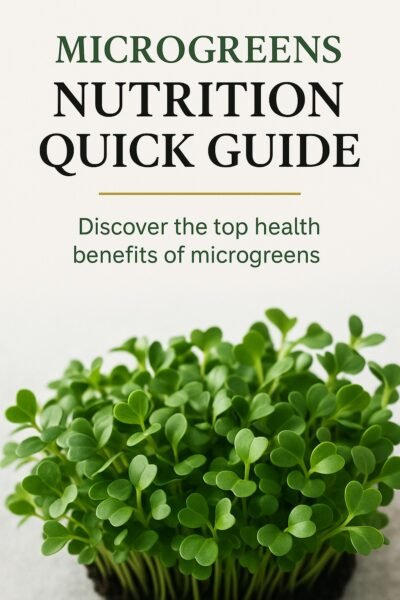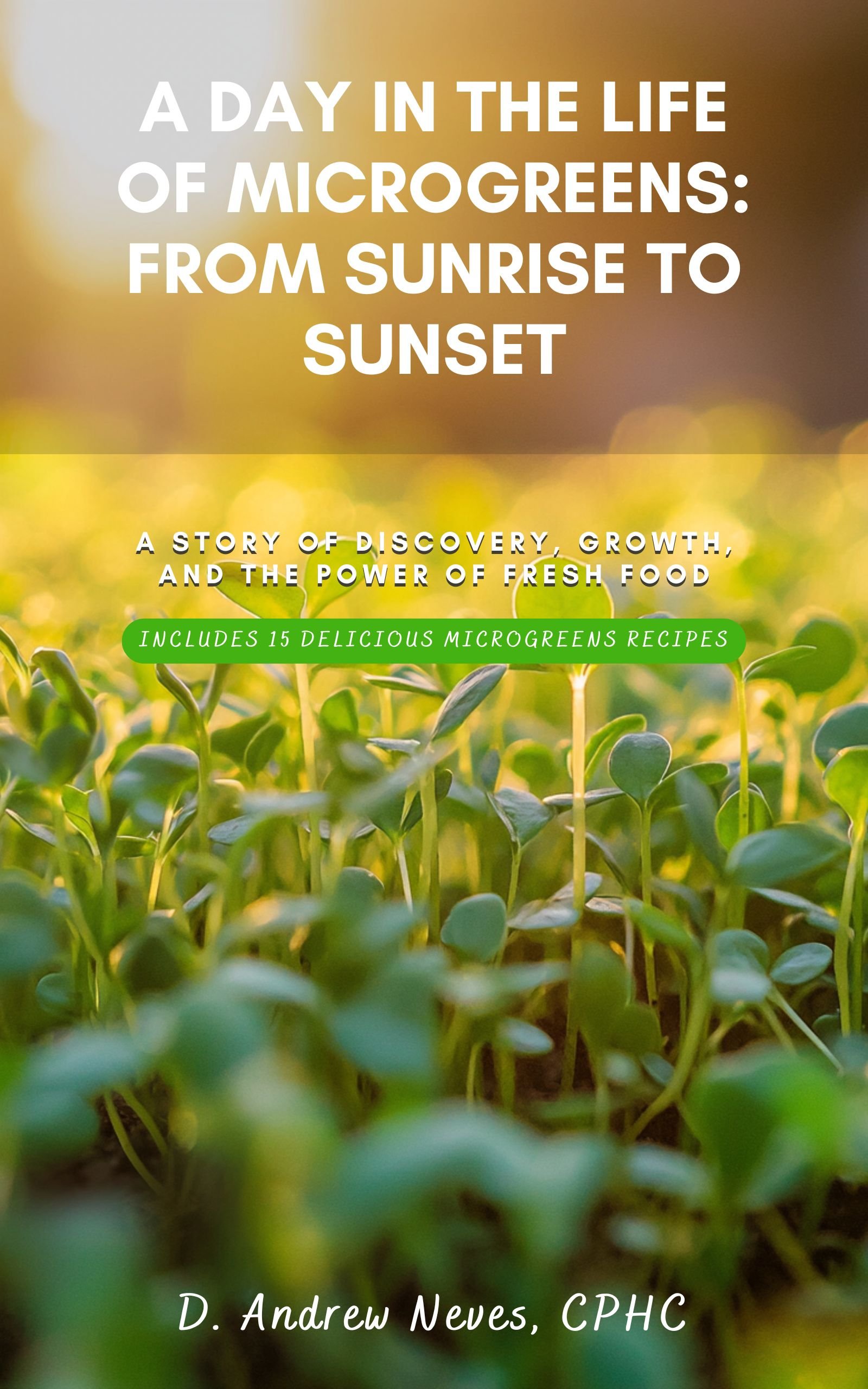Have you ever wondered if those tiny herbs in your garden could be secret superheroes for your health? Imagine harnessing the power of nature’s tiniest warriors to fortify your body’s defenses. That’s precisely what micro herbs can do to boost the immune system. These miniature marvels pack a powerful punch, concentrated with nutrients that can transform your well-being.
But here’s the thing.
Not all micro herbs are created equal. Some stand out as true champions in the fight for robust health. Turmeric, echinacea, parsley, thyme, and garlic – each of these micro herbs has a unique superpower. They’re like the Avengers of the plant world, assembling to protect you from invaders.
Curious about how these little leaves can make such a big impact? It’s not magic, it’s science.
These micro herbs are brimming with compounds that interact with your body in fascinating ways. They stimulate immune cells, combat inflammation, and even help your body produce proteins essential for fighting off illness.
But don’t just take my word for it.
Let’s dive into the world of these mighty microherbs and discover how they can transform your health, one tiny leaf at a time. Are you ready to unlock the secrets of nature’s miniature medicine cabinet?
Key Takeaways
- Turmeric’s curcumin boosts immune responses through anti-inflammatory and antioxidant properties.
- Echinacea activates macrophages and white blood cells, reducing cold and respiratory infection severity.
- Parsley is rich in vitamins that support immune function and has diuretic and anti-inflammatory benefits.
- Thyme contains thymol, which fights infections and is high in vitamin C to enhance immune defenses.
- Garlic’s allicin improves white blood cell activity and provides antibacterial and antiviral support.
INTERESTED IN MICROGREENS?
Join the community
Join more than 100,000 other health-conscious individuals and couples who visit our site and receive weekly emails from us to help them grow more microgreens to live healthier and longer lives.
Super Immunity with Microherbs
Turmeric: The Golden Immunity Booster
Echinacea: Nature’s Defense Shield
Parsley: Vitamin-Rich Micro Herb
Thyme: Infection-Fighting Herb
Can Micro Herbs Be Consumed in Raw Form for Maximum Benefits?
How Should Micro Herbs Be Stored to Maintain Their Potency?
Are There Any Side Effects of Consuming Micro Herbs Daily?
Can Children and Pregnant Women Safely Consume Micro Herbs?
How Much of Each Micro Herb Should Be Added to a Daily Diet?

But what exactly are micro herbs? They are not microgreens. Instead, they reach maturity and are harvested at 2-4 inches, typically 21-28 days after germination, under specific conditions.
Boost your immune system by adding nutrient-packed micro herbs like turmeric, echinacea, parsley, thyme, and garlic to your routine.
- Turmeric, with its anti-inflammatory curcumin, boosts protein production for immune responses.
- Echinacea’s active compounds stimulate immune cells and reduce cold severity.
- Parsley, rich in essential vitamins, supports immune function and prevents urinary tract infections (UTIs).
- Thyme, loaded with vitamin C and thymol, combats infections and alleviates coughs.
- Garlic’s allicin improves white blood cell activity, amplifying your body’s natural defenses.
Utilizing these small but potent herbs can significantly boost your immune function and promote your general health.
Explore more about these powerful herbs and their benefits.
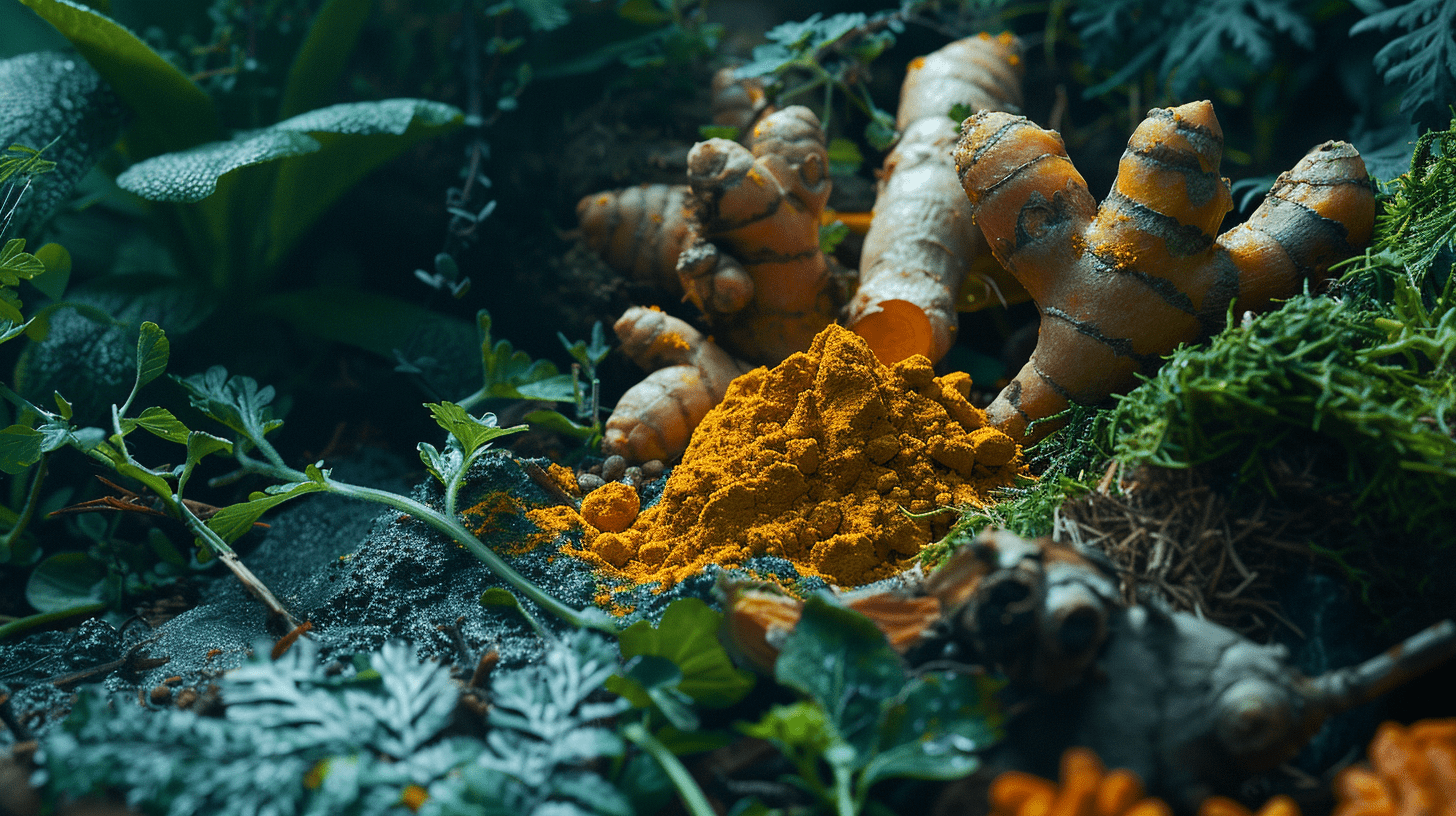
This ‘golden spice,’ turmeric, is renowned for its powerful anti-inflammatory effects and antioxidant qualities, which boost immune function.
Adding turmeric to your everyday diet can aid in decreasing inflammation and combating free radicals – destructive particles capable of harming cellular structures.
The active ingredient curcumin, found in turmeric, enhances your system’s capacity to ward off illnesses and pathogens. It’s been shown to increase the production of essential proteins that regulate immune responses, ensuring a robust defense mechanism (Chaurasia et al., 2022).
Turmeric can be a crucial component in preserving your wellbeing, whether consumed in food, beverages, or as a dietary supplement.
By choosing turmeric, you’re taking a proactive step towards serving others with a resilient, healthy body.

Similar to turmeric’s immune-strengthening effects, echinacea acts as a natural protective barrier, renowned for its capacity to enhance the body’s defenses against various pathogens.
Rich in active compounds like alkamides and polysaccharides, echinacea microherbs effectively stimulate your immune cells, enhancing their ability to combat pathogens.
Research (Bokelmann, 2022) indicates that echinacea may shorten and lessen the intensity of respiratory illnesses and common colds. Regular consumption of Echinacea aids in stimulating white blood cells like macrophages, which are crucial components of your body’s immune defenses.
This micro herb not only helps in warding off illnesses but also in maintaining overall health. It’s a proactive choice for anyone committed to serving others by staying healthy and resilient.

Packed with crucial vitamins and protective compounds, parsley delivers substantial reinforcement to your body’s immune capabilities. Rich in vitamins C, B, K, and A, parsley micro herbs help fortify your body’s defenses.
These nutrient-dense greens are known for their diuretic properties, aiding in the prevention of kidney stones and urinary tract infections (Charles, 2012). Parsley also boasts anti-inflammatory and anti-cancer benefits, making it a versatile addition to your diet.
By incorporating parsley micro herbs into your meals, you’re not just adding flavor but also enhancing your overall well-being. Their high vitamin content supports immune function, helping you stay healthy and resilient against illnesses.
Embrace parsley’s nutritional power and take a proactive step toward better health.

While parsley brings a wealth of vitamins to your table, thyme stands out as a formidable ally in combating infections.
Rich in vitamin C and iron, thyme micro herbs are potent natural remedies against bacterial and fungal invaders (Charles, 2012). Adding thyme to your meals can enhance your body’s capacity to resist and combat various diseases.
Here’s why thyme is vital for your health:
- Antimicrobial Properties: Thyme contains thymol, a compound known for its capacity to fight infections.
- Cough Relief: It helps alleviate respiratory ailments like coughs and bronchitis.
- Immune Boosting: High vitamin C content fortifies your immune defenses.
- Iron-rich: Adequate iron levels are essential for maintaining healthy blood cells.
Integrate thyme micro herbs to strengthen your immunity effectively.

Garlic, well-known for its potent antibacterial and antiviral qualities, is a powerful ally in strengthening the immune system. By including garlic in your daily routine, you’re boosting your body’s natural defenses.
Allicin, a sulfur compound in garlic, improves the activity of white blood cells, making them more efficient at combating infections. This micro herb not only helps prevent common colds but also fights more severe infections.
Scientific studies demonstrate that regular garlic intake can reduce the severity and duration of illnesses (Lidiková et al., 2023). So, by adding garlic to your meals, you’re not just enriching flavor—you’re actively supporting your immune health.
Embrace garlic’s potent advantages and help others by sharing its outstanding properties.
By incorporating these nutrient-packed micro herbs into your daily routine, you’ll fortify your immune system and boost your overall well-being.
Turmeric’s golden power, echinacea’s defense shield, parsley’s vitamin richness, thyme’s infection-fighting properties, and garlic’s immune-strengthening prowess all work synergistically to keep you healthy.
Don’t wait for illness to strike—take proactive steps now. Harness the science behind these potent herbs and give your immune system the support it needs to thrive.
Can Micro Herbs Be Consumed in Raw Form for Maximum Benefits?
Yes, you can consume micro herbs raw to maximize their nutrient content. Eating them fresh preserves essential vitamins, minerals, and enzymes, enhancing their immune-boosting properties and ensuring you serve your body the best.
How Should Micro Herbs Be Stored to Maintain Their Potency?
Store micro herbs in a cool, dry place inside an airtight container to maintain their potency. Refrigeration is ideal, but avoid freezing. Proper storage guarantees they retain their nutrients, helping you serve others with maximum benefits.
Are There Any Side Effects of Consuming Micro Herbs Daily?
Consuming micro herbs daily can have side effects like digestive issues or allergic reactions. It’s essential to monitor your body’s response and consult a healthcare professional to make sure you’re safely benefiting from its nutritional properties.
Can Children and Pregnant Women Safely Consume Micro Herbs?
Yes, children and pregnant women can safely consume micro herbs in moderate amounts. However, it’s always best to consult a healthcare provider to guarantee there are no potential interactions or specific concerns for individual health conditions.
How Much of Each Micro Herb Should Be Added to a Daily Diet?
I add about 1 teaspoon of turmeric, 1-2 teaspoons of echinacea, a handful of parsley and thyme micro herbs, and 1-2 cloves of garlic daily. Always consult a healthcare professional before you make any dietary changes.
INTERESTED IN MICROGREENS?
Join the community
Join more than 100,000 other health-conscious individuals and couples who visit our site and receive weekly emails from us to help them grow more microgreens to live healthier and longer lives.
References
Lidiková, J., Čeryová, N., Tóth, T., Musilová, J., Vollmannová, A., Mammadova, K., & Ivanišová, E. (2023). Garlic (Allium sativum L.): Characterization of Bioactive Compounds and Related Health Benefits. IntechOpen. https://doi.org/10.5772/intechopen.108844
Charles, D.J. (2012). Thyme. In: Antioxidant Properties of Spices, Herbs and Other Sources. Springer, New York, NY. https://doi.org/10.1007/978-1-4614-4310-0_54
Charles, D. J. (2012). Parsley. Handbook of Herbs and Spices, 430–451. https://doi.org/10.1533/9780857095671.430
Pankaj Kumar Chaurasia, Shashi Lata Bharati, Kumar, S., & Mani, A. (2022). Turmeric Supplementation and Its Valued Clinical Connections. BENTHAM SCIENCE PUBLISHERS EBooks, 282–288. https://doi.org/10.2174/9789815039566122010013
Bokelmann, J. M. (2022). Echinacea (Echinacea purpurea, Echinacea angustifolia). Elsevier EBooks, 317–322. https://doi.org/10.1016/b978-0-323-84676-9.00041-6
